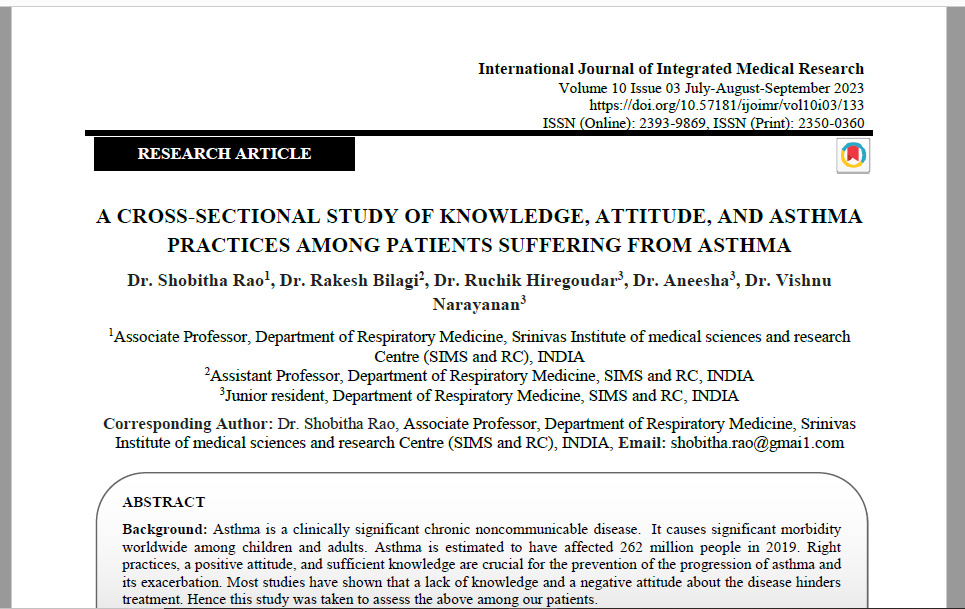A Cross-Sectional Study of Knowledge, Attitude, And Asthma Practices Among Patients Suffering from Asthma KNOWLEDGE AND ATTITUDE OF ASTHMA AMONG PATIENTS
Main Article Content
Abstract
Background: Asthma is a clinically significant chronic noncommunicable disease. It causes significant morbidity worldwide among children and adults. Asthma is estimated to have affected 262 million people in 2019. Right practices, a positive attitude, and sufficient knowledge are crucial for the prevention of the progression of asthma and its exacerbation. Most studies have shown that a lack of knowledge and a negative attitude about the disease hinders treatment. Hence this study was taken to assess the above among our patients.
Material and Methodology: The study was observational, descriptive, and cross-sectional in nature. Patients who were diagnosed to have asthma aged more than 18 years were taken for the study. The source of data was the outpatient department of the tertiary care center. Informed consent was taken.
The patients were then handed questionnaires pertaining to the study. The questionnaire was explained to them in their own language.
Results: 61 patients suffering from asthma were included 72.1% of patients knew about wheezing associated with asthma. 32.8% were not able to assess the worsening of the disease. 70 % were not aware of the possible use of a peak flow meter at home for self-monitoring .73% agreed that the best way to treat asthma is by inhalational medication 45% were not aware of reliever medications.
Conclusion: One study found that there is an overall improvement in patient understanding of asthma symptoms. The study showed a significant lack in knowledge of patients regarding a basic understanding of the disease, home monitoring, and the concept of inhaler medications in therapy which needs to be emphasized during counseling.
Article Details
References
Dharmage SC, Perret JL, Custovic A. Epidemiology of asthma in children and adults. Front Pediatr. 2019; 7: 246.
World health organization factsheets on Asthma. 2021. Available from URL:https://www.who.int/news-room/fact-sheets/detail/asthma
Al-Hajjaj MS. Difficult-to-treat asthma, is it really difficult? Annals of thoracic medicine. 2011 Jan;6(1):1.
Chokhani R, Razak A, Waked M, et al. Knowledge, practice pattern and attitude toward asthma management amongst physicians from Nepal, Malaysia, Lebanon, Myanmar and Morocco. Journal of Asthma. 2021 Jul 3;58(7):979-89.
Lindsay JT, Heaney LG. Nonadherence in difficult asthma–facts, myths, and a time to act. Patient preference and adherence. 2013; 7:329.
Onyedum CC, Ukwaja KN, Desalu OO, Ezeudo C. Challenges in the management of bronchial asthma among adults in Nigeria: A systematic review. Annals of Medical and Health Sciences Research. 2013 Sep 18;3(3):324-9.
Al-Muhsen S, Horanieh N, Dulgom S, et al. Poor asthma education and medication compliance are associated with increased emergency department visits by asthmatic children. Annals of thoracic medicine. 2015 Apr;10(2):123.
Prasad R, Gupta R, Verma SK. A study on perception of patients about bronchial asthma. Indian J Allergy Asthma Immunol. 2003;17:85–7.
Gibson PG, Wilson AJ. The use of continuous quality improvement methods to implement practice guidelines in asthma. Journal of quality in clinical practice. 1996 Jun 1;16(2):87-102.
Gupta PP, Gupta KB. Awareness about the disease in asthma patients receiving treatment from physicians at different levels. The Indian Journal of Chest Diseases & Allied Sciences. 2001 Apr 1;43(2):91-5.
Anderson P. Patient preference for and satisfaction with inhaler devices. European Respiratory Review. 2005 Dec 1;14(96):109-16.
Sodhi R, Prasad R, Kushwaha RA, et al. A study to know the knowledge, attitude, and practices of patients of bronchial asthma. International Journal of Medicine and Public Health. 2013;3(3).
Chogtu B, Holla S, Magazine R, Kamath A. Evaluation of relationship of inhaler technique with asthma control and quality of life. Indian journal of pharmacology. 2017 Jan;49(1):110.
Franks TJ, Burton DL, Simpson MD. Patient medication knowledge and adherence to asthma pharmacotherapy: a pilot study in rural Australia. Therapeutics and clinical risk management. 2005 Mar;1(1):33.
Gajanan G, Fernandes N, Avuthu S, Hattiholi J. Assessment of knowledge and attitude of bronchial asthma patients towards their disease. Journal of Evolution of Medical and Dental Sciences. 2015 Nov 9;4(90):15508-15.
Leonardo Cabello MT, Oceja-Setien E, Higuera LG, et al. Assessment of parental asthma knowledge with the Newcastle Asthma Knowledge Questionnaire. Rev Pediatr. 2013 Apr; 15:117-26.
Gajanan G, Fernandes N, Avuthu S, Hattiholi J. Assessment of knowledge and attitude of bronchial asthma patients towards their disease. Journal of Evolution of Medical and Dental Sciences. 2015 Nov 9;4(90):15508-15.
Gowda G, Damodar AS. Illness Perception among Bronchial Asthma Patients Attending a Tertiary Care Hospital in Bengaluru, South India. NJRCM 2017;6(2):106-9.
